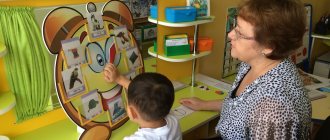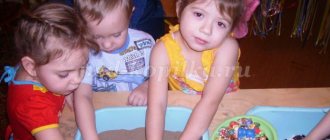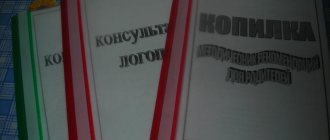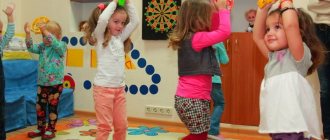“RELATIONSHIP OF THE TEACHER-SPEECH PSYCHOLOGIST AND TEACHER-PSYCHOLOGIST IN KINDERGARTEN”
«RELATIONSHIP OF A Speech-Language Pathologist TEACHER AND A TEACHER-PSYCHOLOGIST IN A KINDERGARTEN»
Velikzhanina K.G.
Teacher speech therapist,
MKDOU No. 459
Novosibirsk city
Recently, much attention has been paid to correctional and developmental work with preschool children with various cognitive and speech disorders, the number of which is increasing every year. Speech correction is carried out by a speech therapist, but in order for this work to be more effective, other specialists should be involved in this process. Who else but an educational psychologist can become a worthy partner in overcoming speech disorders in children of speech pathologists.
We consider the complementarity of the positions of a teacher-psychologist and a teacher-speech therapist in the approach to the child, close cooperation in all areas of work as a necessary condition for ensuring effective work on the full development of the child’s personality, preserving and strengthening his physical, mental and moral health. The objectives of speech therapy work are reduced to social adaptation and integration of a child with a speech disorder into the environment of normally developing peers. Successful implementation of these goals is possible only with close interaction between these specialists in the development (correction) of speech and non-speech mental processes and functions.
A speech therapist and a psychologist pursue different goals in their work, but the ways and means of achieving them quite often turn out to be common. It must be taken into account that there is always a group of children who equally need the help of both specialists.
Planning and implementation of correctional and developmental interventions requires the interaction of a speech therapist and a psychologist in cases where the following problems underlie the difficulties of teaching and raising a child:
· unformed HMF is combined with insufficient speech development;
· speech impairment is accompanied by maladaptive anxiety;
· speech underdevelopment is accompanied by or causes a decrease in educational motivation and self-control.
The work of a speech therapist within the framework of integration may include the following:
· Development of the sound side of speech.
· Development of vocabulary and grammatical structure of speech.
· Formation of coherent speech.
· Formation of full-fledged educational skills and abilities.
The work of a psychologist in conditions of integration may include the following:
· Development and correction of higher mental functions.
. Activation of cognitive activity.
. Creating an environment of psychological support for children with speech disorders.
. Development of memory, attention, thinking.
. Development of arbitrariness and self-control skills, strong-willed qualities.
. Activation of practiced vocabulary.
I believe that cooperation should begin at the initial stage, as soon as the speech therapist and psychologist have studied the medical records of the children at the time of staffing the speech therapy groups.
Based on the data, individual psychological and pedagogical characteristics are compiled for submission to the PMPK. A teacher-psychologist is required to be present at a PMPK meeting in order to perform two functions: “protective” (explaining any situation that requires the competence of a psychologist for a given child) and diagnostic (through the method of observing a child in a new situation, the emotional-volitional sphere is diagnosed, which gives a complete understanding of the levels of development of the emotional, intellectual and communicative spheres of the child at the same time). Thus, even before children enter speech therapy groups, it is possible to obtain all the necessary information on children-speech therapists to draw up their socio-psychological portrait, determine the ways and forms of assistance, as well as select the means and forms of support.
After the planned diagnosis of children, a joint meeting is held. The data obtained make it possible to establish the degree of violation of the psychological characteristics, health status, and compensatory capabilities of the preschooler, and to outline the route of individual development of each child.
An important stage of the work is the creation of a single file of tasks that both a speech therapist and a psychologist could use in their work.
For example, it is reasonable to systematize tasks for the development of memory, thinking, attention, and perception using specially selected lexical material aimed at automating a specific sound.
As an example, I will give tasks from the card index, selected to automate the sound [L]. Developing the ability to find an extra object, we offer children the following task: repeat the words, find the extra word, explain why it is extra. Example: falcon, goldfinch, bow, nightingale. There is an extra onion, because it is a vegetable, and everything else is birds. "Elk, horse, lily of the valley, buffalo." “Boat, shelf, table, chair.” “Salad, chalk, chocolate, kalach.” "Pilot, diver, lamp, cyclist."
Children are of great interest in tasks in which it is necessary to correct errors in the construction of sentences. For example, we invite children to listen to sentences in which the words are mixed up and correct the mistakes, highlighting the sound L: “A flowerbed appeared on the gladioli.” “The Christmas tree walked near the elk.” "The white sky floated on a blue cloud." “The salad was sticking out of the spoon.” "The horse galloped on its rider." “The elephant painted the artist”, etc.
Also, as part of a lesson on the development of coherent speech, the speech therapist offers to compose a story based on a series of plot pictures, and the psychologist invites the children themselves to come up with the ending of the story, thereby pursuing their goal of developing imagination, imaginative thinking, etc.
Thus, we can identify such forms of work that reflect the interaction between a teacher-speech therapist and an educational psychologist in kindergarten:
– conducting and discussing diagnostic results (a speech therapist examines speech, a teacher-psychologist examines cognitive processes, and the level of development of the cognitive sphere);
– correctional and developmental classes (in speech therapy classes, techniques are used to activate mental processes, and in the classes of a teacher-psychologist, children’s speech is activated);
– integrated activities with children;
– parent meetings, trainings for parents, consultations, poster information covering issues of psychology and speech development.
Thus, the organization of interaction between a teacher-speech therapist and an educational psychologist to accompany children in need of speech therapy help allows solving a number of problems:
— Ensuring the integrity and unity of the correctional and developmental space in the content and correctional plans;
— Implementation of full professional interaction in the pedagogical process;
— Updating the forms and content of correctional work with children;
— High professional level and creative nature of teachers’ activities.
The relationship between the work of a speech therapist and a psychologist is not limited to the use of correctional psychological and speech therapy forms and methods in the classroom; mutual integration is much deeper. It involves joint planning and conducting classes, drawing up general plans for correctional work with children requiring increased pedagogical attention, joint monitoring based on the results of examinations and correctional and developmental activities, developing recommendations for teachers and parents on issues of mental and speech development of children, designing visual propaganda for teachers and parents, selection of literature for their self-education.
Thus, both a speech therapist and a psychologist are involved in the development of speech and other mental processes at the same time, but not on equal terms. The main task of a speech therapist is speech development (and correction of higher mental functions contributes to this). Speech development for a psychologist is also one of the main tasks, but in the context of a psychologist’s work, speech is a means of developing intelligence.
The relationship between a speech therapist and a psychologist
The tendency towards deterioration in the speech of preschool children, a decrease in the level of communication skills (A.G. Arushanova, O.S. Ushakova, T.A. Tkachenko, Yu.V. Fillipova, L.M. Shipitsyna) - all this determines the need increasing knowledge about the importance of correctional and developmental work and speech development in children. Recently, much attention has been paid to correctional and developmental work with preschool children with various cognitive and speech disorders, the number of which is increasing every year. Speech correction is carried out by a speech therapist, but in order for this work to be more effective, other specialists should be involved in this process. Who better than an educational psychologist can provide advisory assistance to a speech therapist. Therefore, the idea arose to develop the main directions of interaction between a speech therapist and a psychologist to develop preschoolers’ motivation, comfort in communication and the formation of communication skills through developed speech activity, which will contribute to the harmonious development of the preschooler’s personality in the system of the educational process.
In connection with the recent observation of a decline in the level of speech and communication development of preschool children, it is necessary to create equal starting opportunities in preschool educational institutions for the further education of children at school.
Creating special conditions in preschool educational institutions for the interaction of specialists (speech therapist and psychologist), providing joint correctional and developmental influence will contribute to the formation of full-fledged communicative speech skills in children based on the formed components of speech activity, and the growth of the competence of teachers and parents.
The work of specialists includes the following tasks:
To increase children's speech skills and speech activity in different types of communicative interaction.
Timely prevention and overcoming difficulties in speech development in preschool children.
To create a favorable psychological climate for the development of children's communication skills in various communication situations: with peers, teachers, parents and other people in preschool settings.
Corrective work is divided into the following stages:
- Stage 1 – determining the level of speech development and communication skills in preschool children, identifying those aspects of development that require special attention.
- Stage 2 – development of a system of work and forms of interaction between a speech therapist and a psychologist in a preschool educational environment, which determines the mastery of integrated methods of developing a child’s personality and correcting speech disorders.
- The 3rd stage is analytical activity, which makes it possible to track the effectiveness of correctional and developmental work in close cooperation between a speech therapist and a psychologist, that is, to highlight all possible positive and negative aspects of this activity, and also to track the dynamics of the child’s development.
Participants and main directions of correctional work:
| Direction of work | Teacher speech therapist | Educational psychologist | Educators | Parents |
| 1. Increasing speech skills and speech activity of children in different types of communicative interaction. | Development of dialogical speech through joint storytelling and acting out familiar fairy tales and plots using toys and a series of paintings. | Training exercises for the development of the emotional and social sphere of children. Games that develop children's communication skills. Activities that develop communication skills in children. Exercises to enrich the child’s experience of interaction with adults and peers. | Dramatizations of fairy tales, reading works of fiction, poetry with their further playing out, role-playing games. Activating and increasing the motivation of children in the group to encourage communication with peers and adults. | Activation and increase of motivation of the child in the family, aimed at developing communication skills. |
| 2. Timely prevention and identification of speech and communication difficulties | Preventive work on the formation of components of speech activity. Diagnosis of the level of speech development of children. Education of teachers and parents (booklets, memos, poster information) | Diagnosis of the state of communication skills. Education of teachers and parents (booklets, memos, poster information) | Workshops, consultations on speech and communicative development of children. | To analyze the subject - subject relationships in the family, as a condition for the prevention of speech and communication disorders through questioning of parents, individual consultations. |
| 3. Correction and overcoming speech and communication disorders | Development of the child’s sensorimotor skills; phonetic-phonemic processes; lexico-grammatical categories; coherent speech; semantics (active and passive vocabulary). | Formation of mental processes and correction of the cognitive and emotional sphere. | Interaction with specialists in correcting children’s difficulties through games, exercises, and joint activities. | Joint classes with teachers. Consolidation of acquired knowledge and skills in homework and individual assignments. |
| 4. Creating a favorable psychological climate for the development of children’s communication skills in various communication situations in preschool educational institutions | Increasing the child's motivation to overcome speech problems. Cultivate a respectful and friendly attitude towards each other. | Developing a sense of belonging to a group. Gaining experience of positive interaction. Overcoming barriers in communication. Developing trust in other children and adults, the need for communication and interaction. | Preventing children's attempts to display negative attitudes towards children with speech difficulties. Reading fiction. Formation of the moral and cultural level of children | Participation in kindergarten events: Open Day, Family Day, Games and Toys Week, as well as visiting and active participation in holidays, competitions, parent meetings, round tables. Development of a culture of communication and ethical standards in a child. |
After conducting psycho-speech diagnostics and identifying children with combined disorders, for further correctional work, in addition to traditional speech therapy and psychological games and exercises, a special block of general psycho-speech tasks of different directions was developed for the development of:
- Auditory gnosis and phonetic-phonemic processes.
- Speech sound discrimination and phonemic hearing.
- Auditory-verbal memory.
- Nominative processes.
- Intellectual processes.
- Visual gnosis.
- Causal relationships.
- “Quasi-spatial” (logical-grammatical) speech constructions.
As an example of the work being carried out, we offer a model of interaction between a speech therapist and a psychologist using the example of the development of phonemic perception:
| Areas of work | Speech therapist | Psychologist |
| Development of phonemic hearing | Getting to know the variety of words and their sounds. Dividing sentences into words, words into syllables.
| Speech sound discrimination.
|
| Sound differentiation | Distinguishing speech sounds that are similar in articulatory structure and sound. Tempo-rhythmic side of words.
| Distinguishing between non-speech sounds and everyday noises. Sense of rhythm.
|
| Phonemic representations | Comparing words by sound, becoming familiar with the length of words and their content.
| Development of auditory-verbal memory and attention.
|
| Phonemic analysis and synthesis | Finding the location of a given sound in a word. Definition and characteristics of a given sound.
| Quasi-spatial (logical-grammatical) speech constructions. Subsequence.
|
| Didactic material | See technologies and techniques in integrating a speech therapy room | See the block of general psycho-speech tasks |









